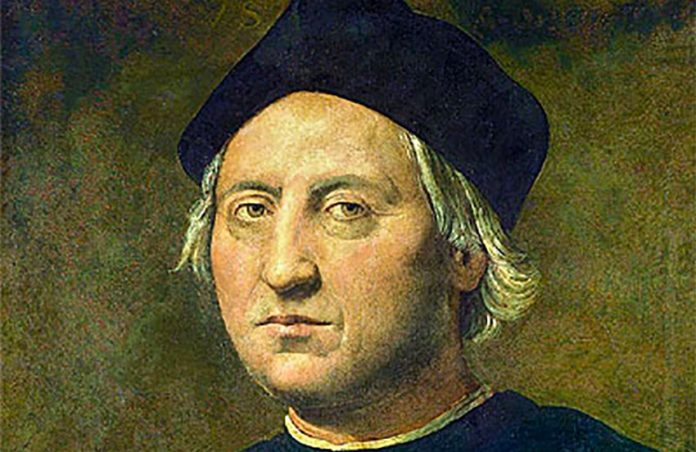One of the books that’s been on my shelf for roughly 20 years now is Howard Zinn’s A People’s History of the United States.
The first chapter is both revealing and shocking, and represents a turning point not just in the history of the world, but in the lives of those who read and became at least somewhat radicalized by the book, never before having thought deeply about the implications of all that Christopher Columbus’ arrival in the Americas really set in motion.
It describes in detail both excerpts from Columbus’ own diary about what fine servants the Arawak would make, saying “With 50 men we could subjugate them all and make them do whatever we want,” as well as the violence against them. The attack on that group of original Americans was brutal and sustained: when they couldn’t lead the Europeans to more gold, they were taken as slaves.
If there’s any doubt as to how miserable the newly-arrived were making things, keep in mind that the Arawak deliberately killed their infants so that the little ones might escape the wrath of the newcomers. Mass suicide was the norm, and those who didn’t off themselves soon met their demise through murder or the brutalities of slavery.
By 1650, there was no trace of the Arawak left in the Caribbean islands. Indeed, there is no trace left of them in the world today. If that’s not genocide, I don’t know what else we’d call it.
So that was Columbus and his men, and what they set in motion. I, for one, can see why people, especially indigenous descendants in the Americas, might have something to say about us celebrating him with his very own holiday. What’s next, Hitler Day?
Exterminating small, peaceful (compared to the Europeans, anyway) populations on small islands is one thing. Once the Spanish moved to the mainland was quite another. Most of us know, at least roughly, how things went down in Mexico.
Yes, many died as Hernán Cortés made his way through the country, but many fought at his side, happy to have someone help them settle the score against what they saw as an oppressive tyrant before they realized the new guy was also not going to just let them go back to how things were, only this time with peace and power.
The very first piece I wrote for Mexico News Daily was about President López Obrador’s request to the government of Spain that they — as well as the Catholic Church — apologize for the conquest of Mexico and the harm that had been caused to the indigenous peoples and cultures already here.
My basic argument was, “Well, why not? It’s a show of good faith that ultimately costs them nothing.” Neither the government of Spain nor the Catholic Church agreed, and it became one of those sources of contention among people that ultimately doesn’t do much more than make everyone grouchy at each other. After all, the requested action would have been merely symbolic at this point. There’s no undoing it now.
Now, what’s long been known as Columbus Day is upon us, and protesters have had things to say about it in ways that echo the demand for statues of Confederate heroes in the U.S. to come down. The president’s wife, Beatriz Gutiérrez Müller, was also dispatched to Europe, part of her mission being to recuperate Mexican indigenous artifacts.
It’s not a new fight.
Though respect for and interest in indigenous culture has been seeing something of an uptick, the language of the invaders is ultimately the language we speak. We are still baptizing our children in the Catholic Church, whose churches and saints swiftly replaced indigenous temples and gods. The prejudices and sensibilities of the invaders, no matter how hard we try to extricate them, are woven into our psyche.
That said, many Mexicans will use the pronouns “we” and “us” to identify themselves with the original indigenous when talking about the conquest: “They invaded us.”
Really, it’s neither/nor; while a few people claim to be “100% Spanish/European” (I’ve known a lot, all of whom have triggered in me an involuntary eye roll) or “100% indigenous” (those who are don’t have to claim this; for many, Spanish is a second language), most Mexicans are a mix of the two: on a cultural level, the children of a powerful and perhaps oblivious father and an under-appreciated, violently-taken but proud mother.
Christopher Columbus didn’t simply go “from explorer to villain;” he was both explorer and villain. This same kind of duality exists in every aspect of Mexican culture, and perhaps in human culture, in a kind of never-ending Walt Whitman poem. Humans and societies are messy, and most of us, on both a macro and micro level, are many opposing forces at once.
But this fact remains: the indigenous got a raw deal then, and they’re still getting a raw deal now. We haven’t yet figured out how to make things right, but ceasing to pay tribute to the perpetrators more than we already do is a good start.
It’s up to use to decide whom and in what ways we honor those that made us, and what that means for whom and what they produced in real time. If you ask me, the conquistadores have had their time in the sun; it’s time for them to move aside and work at truly honoring, not simply paying lip service to, America’s original peoples.
Replacing Columbus Day on the calendar with Indigenous People’s Day would a move in that direction. Putting monuments in his honor in museums rather than in public would be, too.
How we reconcile history matters. Let’s learn to see Mexican culture as a quilt, not a totem pole, and step back from our centuries-long habit of honoring the instigators of mass atrocity.
Sarah DeVries writes from her home in Xalapa, Veracruz.
